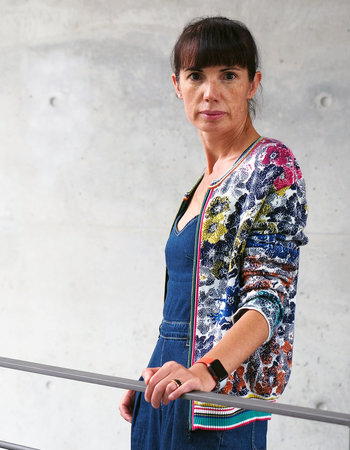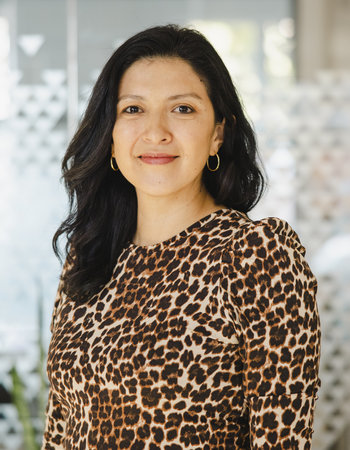“There is still plenty to do”
An interview on the occasion of the International Day of Women and Girls in Science
February 11 is International Day of Women and Girls in Science. On this occasion we spoke with Max Planck Institute for Infection Biology malaria researchers Paola Carrillo-Bustamante and Silvia Portugal. In the interview, the two talk about their careers as female researchers and discuss how women can be better supported on their path to working in science. Should we focus more on self-empowerment through mentoring or create safe spaces for women at conferences? And what can men do for more gender equality in research? In the interview you can find answers and ideas for discussion.

This year's topic for the women in science day is "bringing everyone forward for a sustainable and equitable development". Why is it important to have everyone on board for malaria research?
Paola Carrillo-Bustamante: I think the greater the diversity, the higher the collective intelligence to solve a problem. In the first world, we are not facing malaria, but having all sorts of collaborations with people from the global south gives us additional knowledge. That's why I think interdisciplinarity is important—not only focusing on the biology, but also many other factors. Especially for my research, where I use models to prevent or predict possible outcomes of infections.
Silvia Portugal: Malaria is a complex system, so every piece of input important. Different minds from different backgrounds, like different genders for example, will enrich it.
There are more female than male graduates—especially in life sciences—, but women are still underrepresented among professors and group leaders. What helped you to stay in science?
Silvia Portugal: Good fortune! But also, a mental decision: this is what I want to do and I will try it. I was very fortunate and I don't feel that I had to fight harder at any point of my career for being a woman. I never felt either deterred from doing something because I was a woman or favoured because of that either.
And maybe I am a bit oblivious to those things. I did hear comments, but I tend to think that those are just stupid comments from stupid people. I don’t think I am very easy to hurt in that sense.
Paola Carrillo-Bustamante: It’s similar for me, a determination of continuing. Although I must also say I am not at all in any leading position yet. I am still on the road, trying to figure out if I could also fight the barrier. But I think it’s the mentorship that has played a crucial role in my case not to give up.
I studied electrical engineering and I one of the reasons I left the discipline was because of the environment. There were female-led workshops for female students in which the message was conveyed that one needs to be as male as possible if you want to succeed—this was openly discussed. I did not want to be that person.
When I changed to biology, there were visible role models and people that didn’t make a fuzz about your gender. It was just your intellect that mattered and your potential that they supported. And for me, being very aware of what it means to be a woman from the global south in a men-dominated field of research this was very refreshing. This is what I have been looking for ever since.
What do you think can be done about this gap between women and men in leadership positions in research?
Silvia Portugal: I think there is still plenty to do to close the gap between the proportion of women in graduate schools compared to leadership. And something has to be done to help the male community too. Because this gap is in large parts associated with family, right? It is when we decide to have kids that the problem starts.
The oldest solution that people have found is to give women extra years to apply for grants or give women time off. But this just continues to link all care work to women. What we probably need is a more equal parenting solution, where we are willing to take off some of that time of work for men, too. Men should also be given the opportunity to follow their kids more closely and spend more time with them. In research these opportunities are often missing.
Paola Carrillo-Bustamante: I can only agree with that. The major hurdle when I became a mother was not from the outside but from within. My productivity went down—despite having a supportive partner and a supportive social system. It’s about the roles that are in our unconscious minds and that permeate our entire society. For example, the fact that the childcare always calls me first when something goes wrong and not my partner.
Silvia Portugal: Absolutely.
Paola Carrillo-Bustamante: There recently was an action call from the organization “Mothers in Science” where I am volunteering. It’s a call for research funding agencies to adopt policies to make research funding much more accessible to parents. And it's not only about increasing the leave period.
During your scientific career you were supervised by both men and women. Do you think you profited from their respective perspectives?
Silvia Portugal: I can see differences in mentorship. I only had two supervisors, a man and a woman, but I am not sure if the differences between the two necessarily came from gender.
Paola Carrillo-Bustamante: I also don't see clear differences related to gender. During my PhD I was co-supervised by a man and a woman and they had different mentoring styles. It was a bit funny, because it sometimes felt like a family—mum, dad, and the child. But they both agreed on when to talk about my personal life and when to support me in the technical part of my PhD. It was very holistic.
But my current supervisor, Elena Levashina [Head of the research group Vector Biology at the MPIIB] is very aware of the issues that women in science face and often points me to female-only programs that she thinks I could benefit from. At the stage where I am right now this is very helpful.
The network ‘Women in Malaria’ tries to connect female researchers working in the field of malaria. There are comparable networks in other fields of research, but to us malaria seems to stand out. Is there something specific about the gender balance in malaria research?
Paola Carrillo-Bustamante: I don't know if there are more women active in the malaria field, but many of the malaria researchers I know happen to be women.
Silvia Portugal: I don't know much about the other fields, but I know that 'Women in malaria’ came from the larger network ‘Women in parasitology’. I think we are lucky enough to have a couple of upfront women that started “women in malaria”, but I also think that one should be careful about isolating too much. We should not build a women's club to replace the men's club we had to deal with for the past centuries. So, I take it well but with a grain of salt—making sure be more open than the previous club.
Could you elaborate on what you mean with more openness? Do you mean a specific action or approach?
Silvia Portugal: In the ‘Women in Malaria’ conference in 2021 for example I could not understand why men were not allowed to present their work. I don’t see the point in having these limitations. Preventing men from presenting their work seems similar to what we complained about the men's club.
Paola Carrillo-Bustamante: I actually think the conversation in the conference was more open and less confrontative, less aggressive. Maybe because it was an online conference and it is easier just to type a question. But it could also be because it was all women. I think many women tend to feel intimidated if there are more men at a conference.
Silvia Portugal: But you can't want that, right? That it always has to be only girls in order that you can speak.
Paola Carrillo-Bustamante: No, we cannot, absolutely. That's definitely not sustainable, but I think that there is the need right now for having secure spaces. Allowing this type of conversations alone because there is still clearly an issue. Having groups limited to certain target audiences is a necessary step to rebuild and change the structure.
Silvia Portugal: I think it's a matter of calling this to our attention. I was on a large conference and at the end of the first day the organizer of the ‘power hour’ for women showed that more than 80 percent of the questions that day had been asked by men. She were just putting it out there that women in the room would consider maybe...
Paola Carrillo-Bustamante: Sitting in the front row and asking more questions.
Silvia Portugal: Or raising the arm very sharply and make themself noticed somehow. And the rest of the conference we reached that 50 percent. It works: It's you not raising your arm, it's you not sitting in the front, there's nobody preventing you from doing that.
Right, but it might be important to first empower this target group.
Paola Carrillo-Bustamante: There was this presentation workshop for only women at the MPIIB. All of us had exactly the same issue to discuss: that one of the most stressful things at talks is to raise your hand and to ask a question. When we discussed this with the male postdocs they were really surprised and had no idea we were having this issue saying that they would never think twice about asking a question.
This seems to be a problem for everyone, but overrepresented in one gender. Why, I don't know. But I am convinced that we still need the safe spaces. We need encouragement, we need to treat everyone equally and for the people that don't feel safe enough to ask a question there need to be these subgroups.
Silvia Portugal: They help for sure.
We talked a lot about your perspectives—female perspectives. What advice would you have for a male colleague towards a more equitable development in research?
Paola Carrillo-Bustamante: I think one general advice is trying to put yourself in the other person's shoes. Because our experiences might be completely different. This holds also true beyond gender identity. And in general, try to be collaborative and supportive.
Silvia Portugal: I guess it's just about being fair and kind. Just hire the best person and treat them fairly.
Interview conducted by Juliane Lippmann and Christian Denkhaus.

Silvia Portugal

